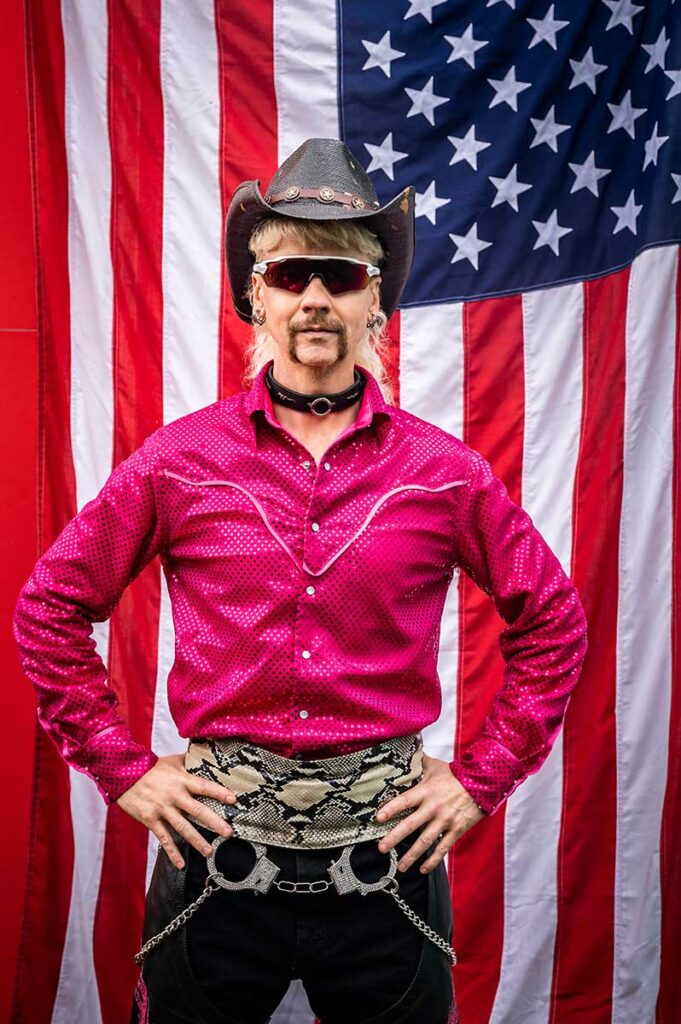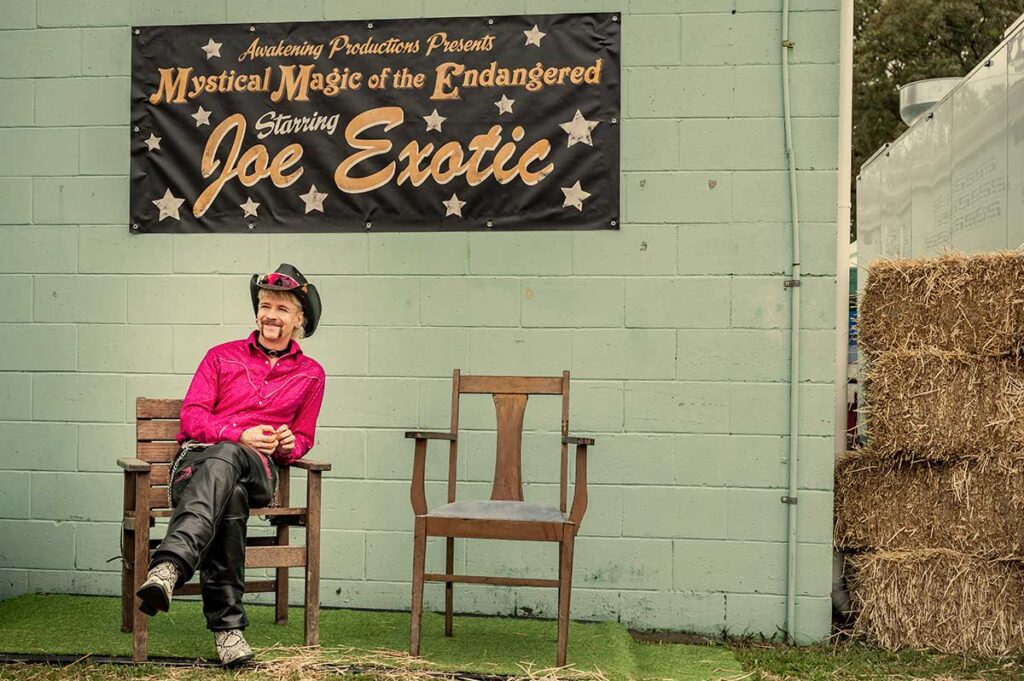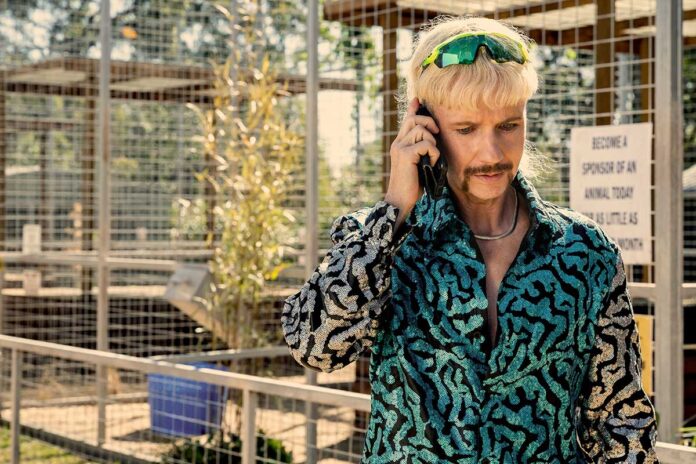What could Joe “Tiger King” Exotic and fictional genderqueer arthouse punk-rocker Hedwig Robinson possibly have in common? John Cameron Mitchell.
And so, the Farrah Fawcett wig comes off the 58-year-old actor who created Hedwig and brought her Off-Broadway in 1998, before “Hedwig and the Angry Inch” became a cult indie film three years later, in 2001. Instead, to portray the wildly controversial and buzzy gay subject of the Netflix docuseries “Tiger King” for the new Peacock series “Joe vs. Carole,” Mitchell’s rocking a “Bring Me Some Water”-era Melissa Etheridge mullet.
In this eight-episode dramatization of Exotic’s ludicrous run as the Oklahoma zookeeper infamous for his cruel treatment of animals and his plot to kill animal rights activist Carole Baskin (played here by Kate McKinnon), Mitchell slips out of Hedwig’s heels and into Joe’s cowboy boots. (Exotic is currently serving a 21-year prison sentencing for hiring two men to kill Baskin.) The purely scandalous story told in the Netflix series is still scandalous — how could it not be? — but with a humanizing bent to it. You might even find yourself liking the guy. Which, as we’ve seen with the Trumps and Putins of the world, is a slippery and dangerous slope.
From his apartment in New York, Mitchell, who recently came out as non-binary, spoke about why Joe Exotic is “the real Trump,” a podcast he’s working on that takes on cancel culture, and how this generation’s wokeisms are inadvertently working against the very allies they seek.

I’ve followed your career for a long time, and being this indie art guy, a lead role in a Peacock series must feel like a big moment.
I’m old enough to know that it comes and goes. I was able to buy a house for the first time. I’ve always kept my overhead low. And I was like, well, I’m getting older. And so this came along and it was a dream job. I loved everybody. I had a great time. They took my input. Kate’s amazing. Etan [Frankel], the showrunner, is amazing. And we shot in Australia, which was very fun and comfortable at the time. I had more fun acting in this on screen than in Hedwig because I had too much responsibility in Hedwig.
Wait, so “Joe vs. Carole” allowed you to buy the house?
Yes. It’s called money, baby. It’s a mainstream thing. I’m considering another job right now, whether I want to commit to a multiyear thing, but we’ll see. Nice to have options. I’m working on another fictional podcast, which is very fun. This one’s more zany and of-the-moment. Kind of on the subject of cancellation. It’s time to bring our wisdom and humor to bear on a somewhat humorless subject. And I’m also working on a TV series. Pitching a musical TV series. And continuing touring here and there with my concerts.
With “Joe vs. Carole,” I think it’s important to acknowledge that you and Kate, two queer icons, are at the center of this story. There’s something very special about that for me.
I wish we had more to do because we really hit it off and I’m writing her something now I hope she’ll do. Kate and I both obviously have strong opinions about our characters and about humor and about how the characters should be played. Because we’re not really doing the real people; we’re doing an interpretation of them. She’s much funnier than the real Carole. I’m adding my own things to it. It’s maybe 50 percent the real people and 50 percent what we’re bringing to it. Because we’re not doing a “Saturday Night Live” sketch. We’re not doing a karaoke version. We’re wanting to have a full emotional experience. And we’re guessing, also, what these characters might be like when they’re not on camera. And that’s a wonderful thing. We had enough freedom and Etan, the showrunner, was open to that. He cast two queer people in a kind of queer story. And when you see it, it actually feels very queer. The way it’s shot, even. It’s very artificial with hopefully an emotional center. It feels like it’s, perhaps, in that Hedwig model, where you’re not stinting on the humor and the camp, but we’re also honoring the people as real people who’ve been through shit.
Did you recognize that the series’ queerness would extend to its direction, as well, before you signed on?
I didn’t really know about the way it was shooting. Justin Tipping, one of the directors, came up with the way it’s shot. It has certain homages to the Coen brothers, to Danny Boyle, to Hedwig even. It’s highly artificial until it gets real. And that’s how their lives seem. They’re sui generis people. They came from trauma, but they triumphed and created their own kingdoms. But then got corrupted by that power, I think. Joe and Carole could have been buddies. Kate and I even had an improv where we just started making out in a dream sequence. It was improvised. They didn’t keep it in and they won’t let me put it on my Instagram because a lesbian’s kissing a gay man and that’s wrong. Seems right to me.
Seems very right to me.
Yes. Well, I’ll just have to make it happen in another project.
The one that you’re writing for Kate?
That’s for a podcast. We’ll still kiss on the podcast.

I didn’t realize that “Joe vs. Carole” was going to humanize these characters in the way that it has. And there’s so much about Joe that we learned from the series that I didn’t from the docuseries
Because you know, he’s larger than life and, to America, he’s a kind of “Duck Dynasty” meets “Real Housewives” [personality]. He’s not a real person. He’s a paper tiger that’s entertaining and maybe not necessarily empathetic. I actually think when you watch him, he’s so eager to please that you want to hug him and take the gun out of his holster and throw it in the river. And Carole presented a more controlled facade, in a kind of Hillary Clinton way. Which turned people against her, partly because of misogyny. But that’s her defense. And that was Hillary’s defense — to hold it together.
Joe screams about being tough, but you can tell [he] isn’t. He’s a megalomaniac, but he’s not exactly tough. It’s like Trump. If you keep saying you’re the best, you know there’s a hole in your soul if you have to keep reminding yourself. We all know the people who don’t mention it are the strong ones.
So then what do these people do? They exert their power, they become bullies.
They still do. And they can abuse it. Because they have to prop themselves up. That’s what Putin is in a more calculated way. Trump is too inept to be a Putin. But he still engenders popularity amongst people who love a dictator, who want a daddy, and they’re willing to ignore the facts because they think he’s authentic. I don’t know how someone who’s a Thanksgiving Day balloon can appear authentic. And a man of the people when he was born with a silver spoon up his ass. And Joe is the real Trump. He’s from the dirt. He made himself. Nobody handed him millions.
Though, he did build the zoo with his brother’s insurance. And he became a very abusive person, but he’s also a human being.
It dawned on me while watching this that you were born in Texas and raised in Kansas. How did your own origin story help you understand Joe when it came to an understanding of being gay in the South?
It was not exactly the South. I would call it more rural America. Kansas, Oklahoma, Texas are kind of this lower Midwest thing that’s different from the South. East Texas is more Southern. I’m from west Texas, which is more cowboy than Southern gentility. But we did live an hour from where his zoo was before the zoo in Fort Sill. And Saff [Saffery], the trans man whose arm is eaten off [by a tiger], is stationed there, actually.
So I’m conversing with my old friends from Kansas, high school friends, and they’re all like, “Johnny, you got it, you got the accent,” and I’m like, “I know; I grew up with all you all.” And so that makes me feel good that they bought it. Because I hadn’t been there in a while. But when I go back I feel that it’s in my bones the way I do when I’m in Scotland too. My mother’s Scottish, my dad’s American. And I’ve moved around a lot, and I had to feel comfortable in different places. Changed my accent. That’s why I became an actor. But I like the “say a few things in a minimal way, kind of Midwestern” thing. Texan is more loquacious. But Oklahoma, Kansas, Nebraska, Missouri — that’s all like, just say what you mean, try to mean it, say it in a few words. So there’s a warmth and not getting carried away with things. Which I love about it.
And I think that’s probably why Joe didn’t move. Another queer person would go to the big city. I mean, he went to Dallas for a bit, but it [wasn’t] exactly the same as New York or California at that time. So queer people at that time had three options. You either keep your head down and stay in your small community and become the hairdresser or the lesbian gym coach and just keep it quiet and have your wife or husband and maybe just shut up and help people out. That’s a valid way of living. Or you leave and go to the big city and find your queer community. Or you do what Joe did, which was make a community. Build a fortress in the rural area called a zoo or a pet shop or a drag parlor. And I identify with that because, though I did leave, I create my communities. My temporary creative communities with movies and shows and podcasts and the unwanted animals, the misfits with skills, come there and have a good time. But I know that it will end at some point before the infighting can begin, unlike the zoo. So I love a temporary community.
And he just dragged that on for too long.
And when you have ex-cons and rehab folks and you’re not paying them well, it’s going to end in tears. If you seek out lovers who are lost themselves, and there’s drugs involved, you know there’s going to be trouble. I feel like his first relationship was the most stable. Even though I think his husband had a drug problem and died of AIDS, that was [his] most healthy relationship. He was grounding for Joe and he had as much power as Joe. Later, he sought out people that he could Lord over, but save as well. There’s a thin line between savior and cult leader.
I was thinking about the physicality of Joe, because there’s a lot going on here. And none of it is really you. And that includes the wig, the facial hair, of which you have none, the jewelry, the tats and the shiny tiger print shirts. What piece really helped you transform into Joe?
A cowboy boot with a heel gives you something, a way of walking. All of it together felt like drag, felt like armor. So when I get into the wig and the makeup and the costumes, it’s the same as Hedwig. And in fact, the characters have a lot in common. They’re both misfits who create their own world to survive it and lash out at people because of their early trauma. Lord over people. Hedwig breaks that cycle. Joe doesn’t.
Watching you I was like, “Oh yeah, this is like dressing up as Hedwig.”
I felt like a drag king. I felt like a lesbian identified gay man. The Melissa Etheridge mullet and all.
Switching gears, let’s talk about “Shortbus,” your 2006 film that has been remastered in 4K and is currently screening across the U.S. before its Blu-ray and streaming release later this year. How do you think “Shortbus” plays to younger generations who are seeing it for the first time?
The screenings I’ve been to with people who remember it and people who it’s new to — young people — is interesting. The older people who saw it in their 20s and 30s were like, “Gosh, that sex is like whatever now, but it’s the deeper stuff that really gets me now.” And the young people are like, “People have sex like that?” They’re all like, “Is there a consent issue?” They’re looking for something un-PC about it and they can’t quite figure out what it is.
They love it. But they’re being taught lately they have to find trouble with most things. One of them who loved the film said, “What would you say if someone” — a very journalist way of saying what they’re thinking — “said, ‘Is it your right to tell the story of an Asian woman who can’t have an orgasm?’” And I said, “Well, to that person, whoever said that, which is not you, I would say, it is my story. We developed this together.” There’s elements of me, and I’m a Toni Morrison fan. When Toni’s students were like, “I’m going to write about my going to Europe,” she was like, “You will not. You will write about something you don’t know anything about. You, little Black girl, are going to write about that white frat boy in Houston. And you’re going to find out what that world is and you’re going to enter it.” And that is the beginning of empathy. There’s no other purpose for fiction.
If you keep splitting those hairs looking for trouble, you stop the organ called empathy. You clog it with unnecessary wokeisms that have good intentions. They cloud the mind, and they stop you from feeling. And they do Trump’s work, and you start lashing out at your natural friends and allies. That’s what he wants us to do, kill each other so he can take over.
That seems like your jumping off point for the podcast you’re working on.
Exactly. So when someone said that,“Have you considered remaking ‘Shortbus’ with a more diverse cast?” I’m like, “Why not talk to that other woman who said it’s not my story to tell?” We made this film with the very few handful of people who were willing to go into that sexual realm. And I wanted it to be as diverse as possible. But I also got who I got and I was very happy with them. I couldn’t find a lesbian couple, for example, who wanted to do it. So I recreated it. And I work with people who are in effect playing versions of themselves. “Shortbus” is as authentic as anything I’ve ever made in terms of the reality of these characters, the reality of the setting, the reality of the extras. No one had a problem on that film. Whereas today I don’t think it could be made because of the panic about sex and representation and everything else.
I wondered about the sex in particular, because I know it’s not simulated, but we have shows like “Euphoria” where we’re seeing a lot more frank sex in content.
It’s still grim, though. God. It’s still depressing sex. Depression porn.
“Shortbus” was not depressing sex. I remember feeling sexually empowered by watching it.
Good. God knows there are very creative people in the world. I think they’re being clogged. A lot of people turn to me, my young friends, and say, “How do I get rid of that feeling?” Because they know that my work embodies following your impulses in a disciplined way and not being afraid of not fitting in, or being famous, or being rich. There was something called art for art’s sake. That would be my drag king name — Art for Art’s Sake. May be even better than Hell of a Bottom Carter.
You have to play. This is your time to play. Now that COVID is over, it’s your time to travel to get out of this hamster wheel of American social media. Go to Latin America, go somewhere you’ve never been and find out that other people are living in different ways. We’re shocked by what’s happening in Ukraine. I think what’s happening there is a fucking a tragedy and a crime. But at least it’s reminding people that we’re human.
Chris Azzopardi is the Editorial Director of Pride Source Media Group and Q Syndicate, the national LGBTQ+ wire service. He has interviewed a multitude of superstars, including Cher, Meryl Streep, Mariah Carey and Beyoncé. His work has also appeared in The New York Times, Vanity Fair, GQ and Billboard. Reach him via Twitter @chrisazzopardi.

